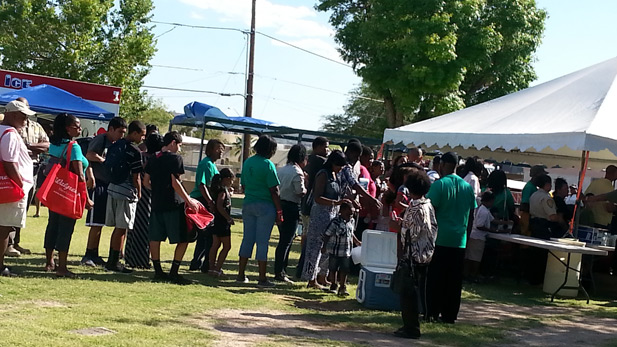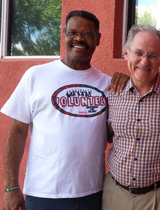 An indoor-outdoor festival, Juneteenth features live entertainment, games, crafts and information.
An indoor-outdoor festival, Juneteenth features live entertainment, games, crafts and information.Listen:
June 19, also called “Juneteenth,” marks the day when the last slaves in the United States were freed. This year, a diverse community participated in Tucson’s 44th annual Juneteenth Freedom Festival, and the organizers emphasized Juneteenth is not just for African Americans.
The Emancipation Proclamation took effect in 1863, but not until two and half years later did word reach the slaves in Texas. In Galveston, on June 19, 1865, the last slaves were informed that they were free. That day became known in Texas as “Juneteenth.”
“When that day happened,” says Burney Starks, president of Tucson’s Juneteenth Committee, “it is said, it was met with great celebration and people saying, ‘This is going to be celebrated about the same as American Independence Day.’ “
This year’s day-long celebration at the Donna Liggins Parks and Recreation Center features a mobile museum of African American memorabilia, a basketball tournament, carnival games for kids, live entertainment and free soul food.
 Burney Starks and Tucson Mayor Jonathan Rothschild at the Juneteenth Freedom Festival.
Burney Starks and Tucson Mayor Jonathan Rothschild at the Juneteenth Freedom Festival.Juneteenth is still primarily seen as an African American holiday, and Starks thinks that’s wrong.
“When you talk about the day the last American in this country, the land of the free, was actually freed, that’s a significant date in the history of the United States of America," he says. "Not just for black people. This is not a black holiday. This is an American holiday, and that’s the way we need to accept it.”
He says there are 43 states that designated Juneteenth as a state holiday or a state holiday observance. Arizona is not one of them. but Tucson is unique in that it’s had 44 consecutive years of Juneteenth celebrations.
In the past few years, the Tucson celebrations have been changing in a subtle way. The chair of the Juneteenth Festival committee, Esther Sharif, is working to make Juneteenth appeal to Tucson’s diverse community.
“We emphasize here at Juneteenth the celebration of freedom for African Americans,” she says. "But we also want people to leave away saying, “We learned about African Americans; so I need to learn about my own.”
Tucson Mayor Jonathan Rothschild says he finds personal meaning in Juneteenth.
“My background is such that every year we celebrate Passover which is really the celebration the coming out of slavery. So Juneteenth, which is also the celebration of coming out of slavery for another people, is something that we should all relate to, and I certainly do," he says.
Many of the Juneteenth participants are volunteers.
There are two large rooms filled with information tables for all kinds of community partners and organizations: the Buffalo Soldiers, the State’s Attorney, black-owned businesses, the Tucson Police and Fire Departments, as well as Tucson health organizations, businesses and nonprofits.
Deputy Tracy Suit, spokesman for the Pima County Sheriff, staffs an information table for the department. He’s African American, and he likes the idea that Juneteenth belongs to the whole community and not just to African Americans.
“We’re all here together. It’s a big melting pot. We all should share in everyone’s successes," he says.
Juneteenth is a celebration of freedom, but awareness of what happened during slavery and the continuing racism in America can also be part of the Juneteenth celebration.

By submitting your comments, you hereby give AZPM the right to post your comments and potentially use them in any other form of media operated by this institution.